Published 28 Feb 2024
Rich mathematical tasks strengthen student outcomes – Canterbury Primary School
Engaged students in learning
Ashlee Smith – Learning Specialist / Classroom Teacher
Canterbury Primary School
Schools and early childhood services across Victoria continue to provide quality learning experiences across all levels. The VIT’s Professional Practice team is privileged to see this work first-hand on visits to workplaces around the state. This is just one example showcasing the great work happening in a Victorian school.
Located in Melbourne’s southeast, Canterbury Primary School strives to create a passionate learning community that inspires, challenges and supports all students to achieve their personal best and make a positive contribution to the world.
Learning Specialist / Classroom Teacher Ashlee Smith identified an opportunity to enrich the teaching and learning of mathematics across all levels within the school. Ashlee’s innovative approach saw her recognised among the state’s best as a finalist for the Outstanding Primary Teacher Award.
We spoke to Ashlee about the initiatives put in place to foster innovation at Canterbury Primary School, and the ongoing benefits for learners and staff.
Q: Can you provide some background to your approach in developing the initiative, including any research or established models / strategies that your approach is based upon?
Last year, I co-led an internal review of our mathematics programs, engaging Senior Education Improvement Leaders (SEILS), Education Improvement Leaders (EILs), select classroom teachers and members of our leadership team to ensure a comprehensive perspective. The motivation for improvement came from the necessity to achieve a ‘balanced diet’ approach, meaning a healthy mix of teaching and learning in mathematics. Through in-depth data analysis, focus areas surfaced, with one being the inconsistent implementation of rich mathematical tasks across the school.
Rich tasks are those where there is no clear or known path to finding the solution. This means learners need to use abstract thinking as they work through the problem, often calling on a range of concepts to find the answers.
Using insights from experts like Peter Sullivan and Peter Liljedahl, and tapping into collaborative discussions with regional EILs, we crafted a strategic approach captured through an implementation plan aligned with the Framework for Improving Student Outcomes (FISO) cycle.
Our strategy was anchored in Peter Sullivan's ‘Launch, Explore, Summarise’ model, which we further tailored to embed rich mathematical tasks school-wide. Using this model, the “doing” is the responsibility of the learners, whilst teachers guide and ask questions to draw out their thinking.
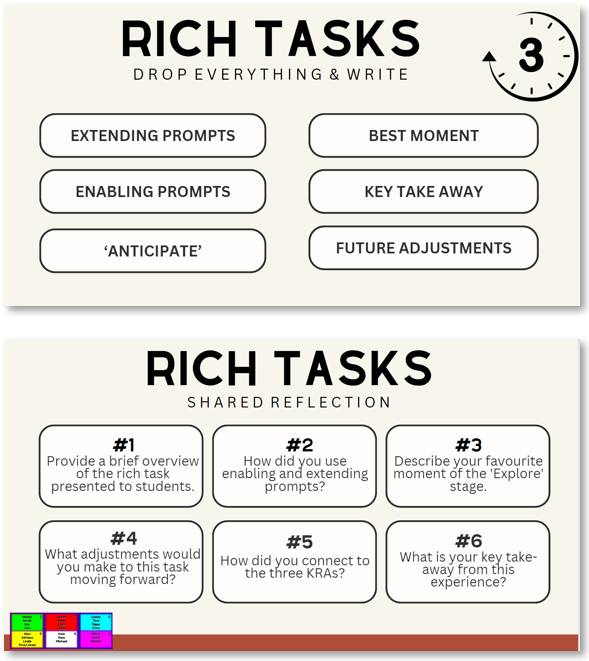
Rich mathematical task example
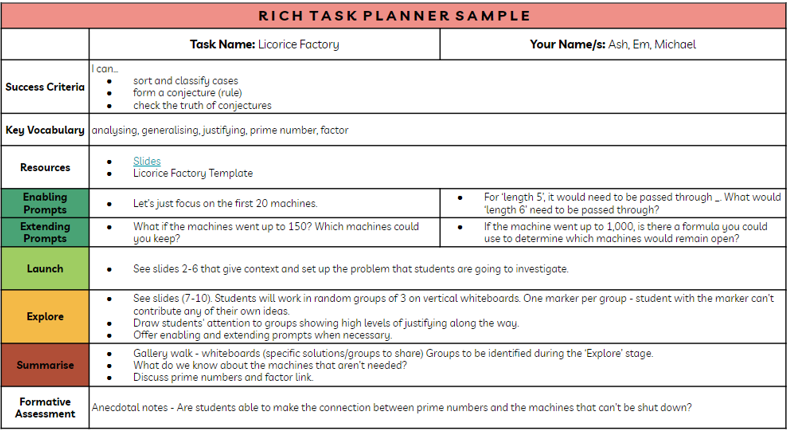
Rich mathematical task planner
Q: What structural things are in place to ensure that the initiative has its best chance of success?
To foster the success of our initiative, we strategically incorporated the following structural elements.
Classroom experimentation and professional development
The initiative kicked off with experimentation in my own classroom before broader implementation. This phase not only deepened our understanding of potential challenges, but also allowed for refinement.
Maths annual implementation plan (AIP) team collaboration and champion development
Collaborating with our Maths AIP Team played a pivotal role in shaping the program. We focused on developing champions within the team, empowering them to lead new learning in their own respective teams. This approach ensured a distributed leadership model, fostering sustainability and scalability.
Resource creation for seamless implementation
We prioritised resource creation with tools such as planning templates, a rich task bank and reflective prompts to support seamless implementation across the school. These resources have proved instrumental in aiding teachers and teams in adopting rich tasks effectively.
Professional learning series with active teacher modelling
Central to our strategy was implementing a high-quality professional learning series, characterised by active teacher modelling. In this series, staff actively assumed the role of learners, while my co-leader and I modelled the role of teachers, showcasing each stage of rich task implementation. This hands-on approach not only heightened staff confidence, but also deepened their understanding.
These sessions were enriched by practices from ‘Building Thinking Classrooms’. This included innovative methods like working in visibly random groups on temporary whiteboards and paper pinned to the wall (described by Liljedahl as “vertical non-permanent surfaces”), fostering an engaging and immersive learning environment.
Q: What are the greatest benefits to staff development of this approach?
The approach has spurred substantial growth in staff development, enhancing their understanding of this crucial component of our balanced diet approach to teaching and learning in mathematics-based subject areas.
Through engaging in rich tasks themselves and participating in collaborative planning sessions, teachers have been equipped with a deeper understanding of best practices. Additionally, teachers have reported enhanced enjoyment when it comes to teaching maths.
Professional learning has cultivated confidence in implementing the ‘Launch, Explore and Summarise’ instructional model with reference to rich tasks, as well as increased confidence in using, enabling and extending prompts to facilitate student learning. Ongoing experimentation with ‘Building Thinking Classroom’ practices has fostered innovation in teaching approaches in this area.
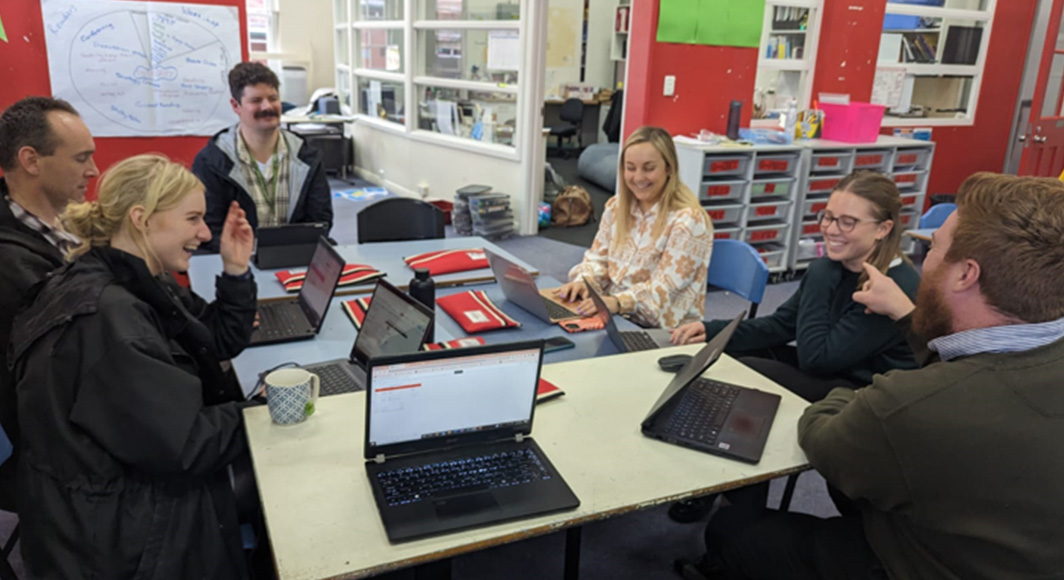
Teachers at Canterbury Primary School
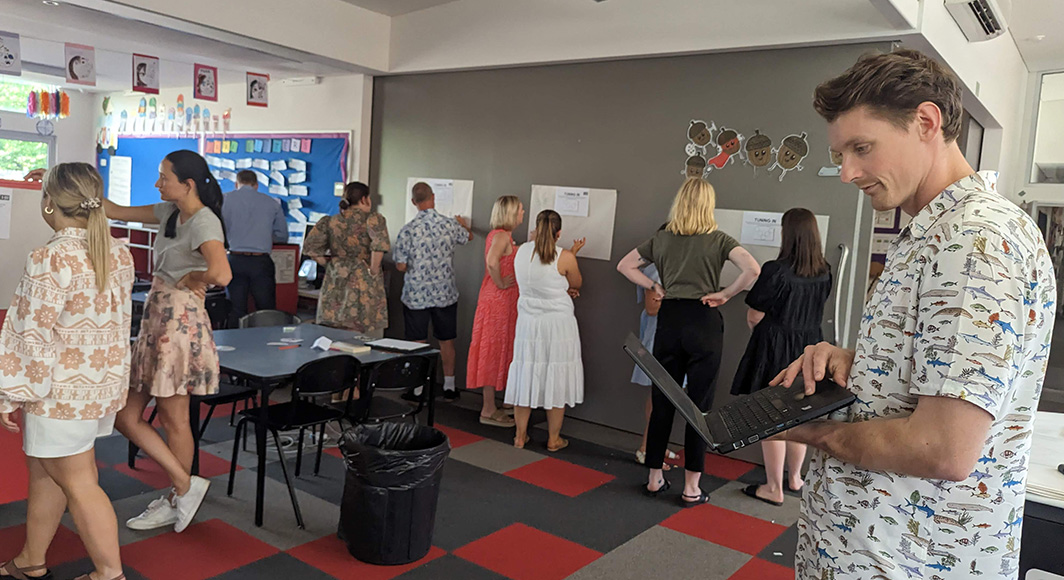
Teachers at Canterbury Primary School
Q: What have been the benefits to learner outcomes of this approach? Please provide some illustrative examples if appropriate.
The implementation of rich mathematical tasks at Canterbury Primary School has enhanced student outcomes. Through engaging in these tasks that prompt students to ‘think hard’, ‘work hard’, and ‘feel good,’ the initiative has stimulated critical thinking and improved problem-solving skills.
We have seen a noticeable increase in the application of reasoning proficiencies, including analysing, generalising, and justifying, showcasing a comprehensive development of students' mathematical skills and competencies.
This approach, coupled with the inclusion of ‘Building Thinking Classrooms’ practices, has contributed to a collaborative learning environment where students
- actively participate in meaningful discussions
- share diverse perspectives
- work together to solve complex problems
- engage in peer teaching opportunities.
The risk-free nature of rich tasks has additionally contributed to confidence building, empowering students to explore various approaches and solutions. Students also continue to demonstrate a deeper understanding of the application of mathematical concepts and skills.
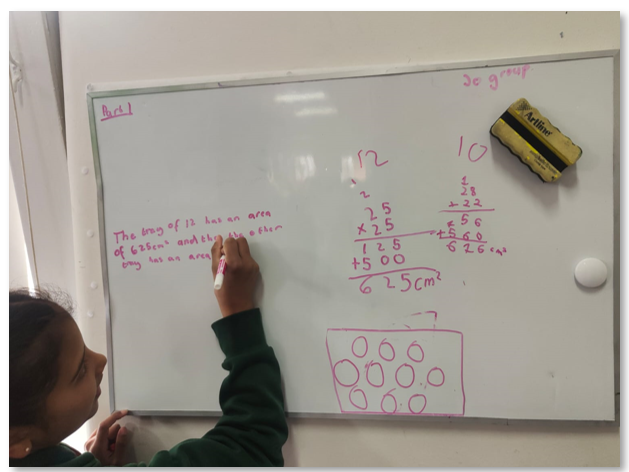
A student working on a rich mathematical task
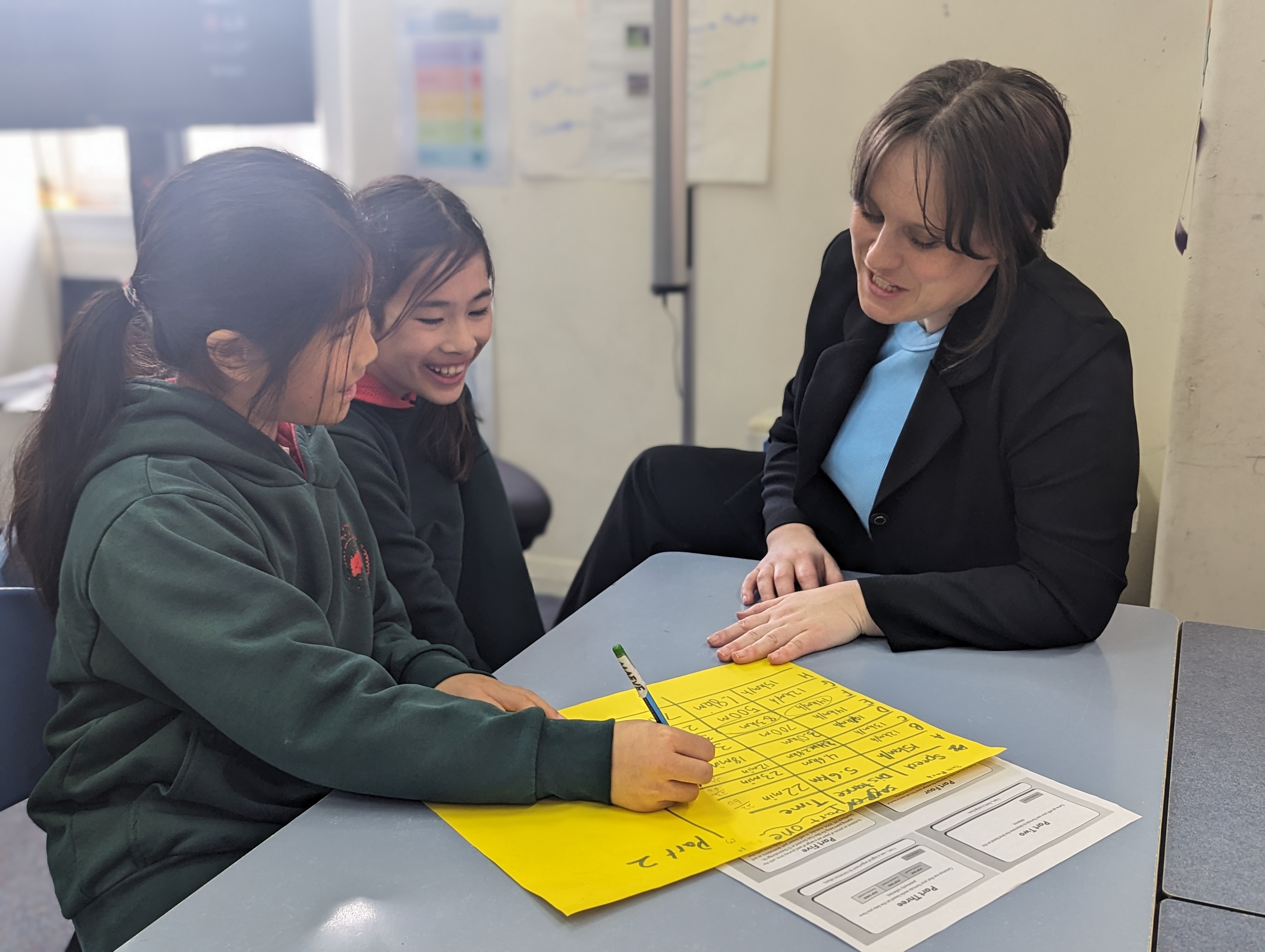
A teacher and students working on a rich mathematical task
Q: What plans does your workplace have to take this approach forward?
Moving forward, we remain dedicated to advancing and solidifying rich mathematical tasks across the school, demonstrating a profound commitment to ongoing progress.
As previously mentioned, key successors to this transformative change include several strategic initiatives. We emphasise starting small and scaling up, anticipating and addressing challenges, providing high-quality professional learning opportunities, and creating high-quality resources.
We will continue to prioritise having champions in each centre team and maintain an ongoing cycle of reflection and monitoring.
As we look ahead, our focus is on further progress through the FISO improvement cycle, with a specific emphasis on the 'going deeper' phase. This phase involves enhancing both staff and student confidence in actively connecting to the three key reasoning actions with reference to engaging in rich tasks.
Q: Can you detail any references or citations applicable?
- Building Thinking Classrooms - Peter Liljedahl
- Launch, Explore, Summarise model – Peter Sullivan
- Framework for Improving Student Outcomes – Department of Education Victoria
Do you have an example of outstanding work in your school or early childhood service? We’d like to consider showcasing it the Excellence in Teaching section of our website. Send your example and contact details to vitcomms@vit.vic.edu.au.
